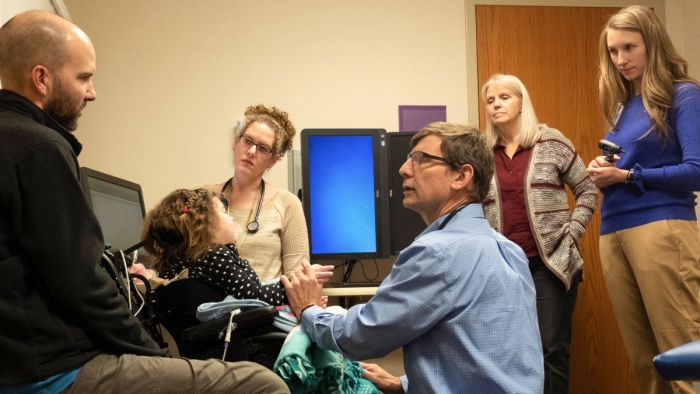Restrictive lung disease as a result of chronic aspiration pneumonia is the most frequent cause of death in patients with cerebral palsy and other neurological impairments. It is estimated that 77% of cerebral palsy deaths are caused by pneumonia; as much as 41% result from aspirational pneumonia. Often, a component of these diseases is the incoordination of the muscles of swallow. This incoordination increases the likelihood that foreign material will enter the lungs.
Sources of aspirated material can include refluxed gastric contents, food and fluid that were taken in by mouth, sinus drainage and saliva. These materials enter the lungs via impaired tracheal protection during the process of swallowing. The Aerodigestive Clinic at Gillette uses detailed history and multiple studies to determine the cause of swallow dysfunction, which may include:
- Aspiration happens as materials transported from the mouth or regurgitated from the esophagus passes through the vocal cords. Aspiration can occur before, during or after swallow.
- Dysphagia is defined as a problem with any step of the feeding or swallowing process. Dysphagia is typically sub-classified by location:
- Oral dysphagia: includes difficulty with chewing, weakness or discoordination of tongue movements, difficulty-manipulating food to form a bolus
- Pharyngeal dysphagia: includes difficulty initiating a timely swallow trigger, nasopharyngeal reflux, penetration, aspiration and choking.
- Esophageal dysphasia: includes difficulty moving food towards the stomach. This occurs after trachea esophageal fissures.
Patients diagnosed with dysphagia may exhibit any of these symptoms:
- Gargling breathing sounds or husky voice
- Breathing problems
- Choking
- Gagging during feedings
- Facial grimacing, face flushing, watery eyes, finger splaying or head-turning away from the food source
- Noise, wet respirations associated with feeding
If you suspect your patient suffers from pulmonary aspiration, a referral to the Gillette Aerodigestive Clinic will efficiently evaluate and treat many of the underlying reasons for aspiration. The multidisciplinary clinic includes pediatric specialists in complex care pediatrics, pulmonary care, ear, nose, and throat (ENT), gastrointestinal (GI), speech therapy, and works closely with sleep medicine and audiology.
Coordinated appointments provide an organized schedule of procedures, which may include a Triple Scope evaluation (ENT, evaluation, bronchoscopy and gastrotomy) Video Fluoroscopic Swallow Study (VFSS), Fiber optic Endoscopic Evaluation of Swallowing (FEES) or impedance probe (which requires an overnight stay). After evaluation, the team develops a coordinated treatment plan, which may include rehabilitation therapy, surgery or medication management.
Identifying the source of aspiration is key to better health in patients with aerodigestive issues. To consult with an Aerodigestive Clinic specialist at Gillette, please call us at 651-325-2200.
Get Partners in Care Stories in your inbox!
Subscribe to Partners in Care Journal, a newsletter for healthcare providers and community health professionals.
Subscribe Today Home Page
Home Page



